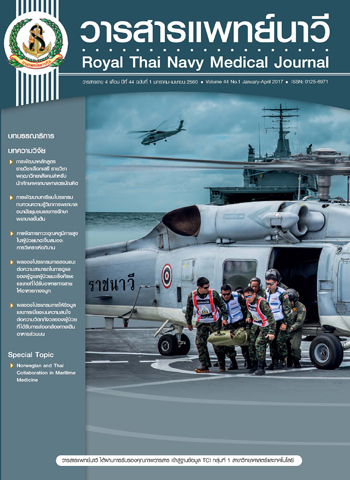ผลของโปรแกรมการสอนแนะต่อความสามารถในการดูแลของผู้ดูแลผู้ป่วยมะเร็งศีรษะและคอที่ได้รับอาหารทางสายให้อาหารทางจมูก
Main Article Content
Abstract
This study employed a quasi-experimental design. It aimed to compare the ability
of caregivers in taking care of patients with head and neck cancer using nasogastric tube
feeding before and after receiving a coaching program and compare the ability between
caregivers in taking care of patients with head and neck cancer using nasogastric tube
feeding who received the coaching program and those who received conventional nursing
care. The research sample comprised 60 caregivers of patients with head and neck cancer
using nasogastric tube feeding at Bhumibol Adulyadej Hospital. Purposive sampling was
used to separate the patients into the control and experiment groups – 30 participants in
each. The groups were matched in terms of sex, age, relationship and education level. The
experiment group received the coaching program. This program was based on the coaching
model of Eaton and Johnson18 who collaborated with the nursing care process while the
control group received the usual nursing care. Experimental tools included the coaching
program, teaching plan and guidebook for caregivers. Data collection included a
questionnaire on demographic information and the ability of the caregiver to take care of
patients with head and neck cancer using nasogastric tube feeding. The experimental
measurement control in this study was the assessment form for the confidence of the
caregiver in taking care of patients. The duration of the study totaled 4 weeks. Data were
analyzed using descriptive statistics and t-test.
Article Details

This work is licensed under a Creative Commons Attribution-NonCommercial-NoDerivatives 4.0 International License.
References
2. Siegel R, Ma J, Zou Z, Jemal A. Epidemiology and risk factors for head and neck cancer. CA Cancer J Clin 2014;64(1):9-29.
3. สถาบันมะเร็งแห่งชาติ. สถิติโรคมะเร็ง 2555. [อินเทอร์เน็ต]. [เข้าถึงเมื่อ 6 มิถุนายน 2558]. Available from: https://nci.go.th.
4. สำนักนโยบายและยุทธศาสตร์ สำนักงานปลัดกระทรวงสาธารณสุข. สถิติโรคมะเร็ง 2555. [อินเทอร์เน็ต]. [เข้าถึงเมื่อ 6 มิถุนายน 2558]. Available from: https://bps2.moe.go.th.
5. แผนกเวชระเบียนและสถิติโรงพยาบาลภูมิพลอดุลยเดช. สถิติผู้ป่วยมะเร็งศีรษะและคอที่เข้ารับการรักษาที่หอผู้ป่วยชั้น 9/2 โรงพยาบาลภูมิพลอดุลยเดช 2558. [อินเทอร์เน็ต]. [เข้าถึงเมื่อ 6 มิถุนายน 2558]. Available from: https://www.bhumibolhospital.rtaf.mi.th.
6. กันยรัตน์ กตัญญู. ความชุกของภาวะทุพโภชนาการในผู้ป่วยมะเร็งรายใหม่ที่เริ่มเข้ารับการรักษาในแผนกรังสีรักษาและมะเร็งวิทยา วิทยาลัยแพทยศาสตร์กรุงเทพมหานครและวชิรพยาบาล. วชิรเวชสาร 2552;53(1):59-67.
7. ชัชสุดา ธนอมรพงศ์, สุวิมล กิมปี, ปรางทิพย์ ฉายพุทธ, เกศศิริ วงษ์คงคำ, ภาวิน เกษกุล. ความสัมพันธ์ระหว่างความต้องการการดูแลด้านมะเร็ง สภาพลิ้น ภาวะโรคร่วมกับภาวะการทำหน้าที่ในช่องปากของผู้ป่วยมะเร็งลิ้นและพื้นปากหลังผ่าตัด. วารสารสภาการพยาบาล 2557;29(1):67-80.
8. จิตติพร ยุบลพริ้ง, ปรางทิพย์ ฉายพุทธ, สุวิมล กิมปี และอรพรรณ โตสิงห์. การพัฒนาแนวปฏิบัติการพยาบาลเพื่อฟื้นฟูการกลืนของผู้ป่วยมะเร็งศีรษะและคอหลังผ่าตัด. วารสารสภาการพยาบาล 2552;24(2):24-38.
9. de Campos RJ, Palma PV, Leite IC. Quality of life in patients with dysphagia after radiation and chemotherapy treatment for head and neck tumors. J Clin Exp Dent 2013;5(3):e122–7.
10. เรวัต วิศรุตเวช. นวัตกรรมอาหารสำหรับผู้ป่วยมะเร็งช่องปาก. วารสารกรมการแพทย์ 2554;16(6):33-40.
11. Patterson JM, Rapley T, Carding PN, Wilson JA, McColl E. Head and neck cancer and dysphagia; caring for carers. Psychooncology 2013;22(8):1815-20.
12. จอม สุวรรณโณ. ความสามารถของผู้ดูแลหลักในการดูแลผู้ป่วยโรคหลอดเลือดสมองในระยะเปลี่ยนผ่านก่อนจำหน่ายออกจากโรงพยาบาล. วารสารสภาการพยาบาล 2546;18(3):1-21.
13. Chang SC, Huang CY, Lin CH, Tu SL, Chao MS, Chen MH. The effects of systematic educational interventions about nasogastric tube feeding on caregivers’ knowledge and skills and the incidence of feeding complications. J Clin Nurs 2015;24(11-12):1567-75.
14. Mayre-Chilton KM, Talwar BP, Goff LM. Different experiences and perspectives between head and neck cancer patients and their care-givers on their daily impact of a gastrostomy tube. J Hum Nutr Diet 2011;24(5):449-59.
15. Longacre ML, Ridge JA, Burtness BA, Galloway TJ, Fang CY. Psychological functioning of caregivers for head and neck cancer patients. Oral Oncol 2012;48(1):18-25.
16. อภิญญา เพียรพิจารณ. แนวคิดพื้นฐานและหลักการพยาบาล เล่ม 2. นนทบุรี: ยุทธรนินทร์การพิมพ; 2553.
17. García-Peris P, Parón L, Velasco C, de la Cuerda C, Camblor M, Bretón I, et al. Long term prevalance of oropharygeal dysphagia in head and neck cancer patients: impact on quality of life. Clin Nutr 2007;26(6):710-7.
18. Eaton J, Johnson R. Coaching successfully. New York: Dorling Kindersley; 2001.
19. Orem DE. Nursing Concept of Practice. St. Louis: Mosby year book; 2001.
20. Meecharoen W, Northouse LL, Sirapo-ngam Y, Monkong S. Family Caregivers for Cancer Patients in Thailand: An Integrative Review. SAGE open 2013 Jul-Sep;1:1-10.
21. Margaret LL, John AR, Barbara AB, Thomas JG, Carolyn YF. Psychological functioning of caregivers for head and neck cancer patients. Oral Oncol 2012;48(1):18-25.
22. จินนะรัตน์ ศรีภัทรภิญโญ. ผลการสอนและการฝึกทักษะแก่ผู้ป่วยโรคหลอดเลือดสมองต่อความสามารถในการดูแลผู้ป่วยและภาวะสุขภาพของผู้ป่วย. [วิทยานิพนธ์พยาบาลศาสตรมหาบัณฑิต สาขาวิชาการพยาบาลผู้ใหญ่]. มหาวิทยาลัยมหิดล; 2540.
23. แสงรุ้ง รักอยู่. ผลของโปรแกรมการสอนแนะต่อความสามารถของผู้ดูแลในการดูแลผู้ป่วยบาดเจ็บไขสันหลังที่ได้รับการคาสายสวนปัสสาวะ. [วิทยานิพนธ์พยาบาลศาสตรมหาบัณฑิต สาขาวิชาการพยาบาลผู้ใหญ่]. จุฬาลงกรณ์มหาวิทยาลัย; 2556.
24. ธัญรดี ปราบริปู. ผลของโปรแกรมการสนับสนุนญาติผู้ดูแลต่อความสามารถและการรับรู้ความสามารถของผู้ป่วยที่ได้รับบาดเจ็บที่สมอง. วารสารกรมแพทย์ทหารอากาศ 2556;59(1);26-49.
25. วาสนา มูลฐี. ผลของโปรแกรมการดูแลผู้ป่วยโรคหลอดเลือดสมองและญาติผู้ดูแลระยะเปลี่ยนผ่านจากโรงพยาบาลสู่บ้านต่อความสามารถในการปฏิบัติกิจวัตรประจำวัน ภาวะแทรกซ้อน และความพึงพอใจของผู้ป่วย. [วิทยานิพนธ์พยาบาลศาสตรมหาบัณฑิต สาขาวิชาพยาบาลศาสตร์]. มหาวิทยาลัยมหิดล; 2559.
26. Grealish L. The skills of coach are an essential element in clinical learning. Journal of Nursing Education. 2000;39(5):231-3.
27. นิชธิมา ศรีจำนง, ทัศนีย์ รวิวรกุล, สุนีย์ ละกำปั่น, พรทิพย์ มาลาธรรม. ผลของโปรแกรมการส่งเสริมการรับรู้ความสามารถของญาติผู้ดูแลผู้ป่วยโรคหลอดเลือดสมองที่บ้าน. วารสารวิทยาลัยพยาบาลบรมราชชนนี กรุงเทพ 2553;26(1):47-69.

